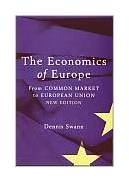|
||
• wydawnictwa polskie
• Zamów informacje o nowościach z wybranego tematu • kontakt
• Cookies na stronie |
ECONOMICS OF EUROPESWANN D.wydawnictwo: PENGUIN , rok wydania 2000, wydanie IXcena netto: Since 'the Six' signed the Treaty of Rome in 1957, massive changes have swept through what was known as the Common Market and is now the European Union. The Union continues to develop in terms of both membership and influence, and with monetary union becoming a reality it is now the centrepiece of the movement towards closer political, social and economic integration in Europe. The Economics of Europe, formerly published as The Economics of the Common Market, has been fully revised to present a picture of the European Union as it enters the new millennium. This new edition builds on previous volumes to provide an in-depth study of the economic principles underlying the extended scope of the EU. It includes an updated survey of the decision-making institutions and a discussion of new legislation, including the Maastricht Treaty of 1992 and the 1997 Treaty of Amsterdam. Other major aspects - transport and tariff barriers, fisheries and factor movements, foreign policy and defence, social, regional and industrial policy, energy and the environment - are given equally comprehensive treatment, as are the challenges facing the European Union today. Księgarnia nie działa. Nie odpowiadamy na pytania i nie realizujemy zamówien. Do odwolania !. |


